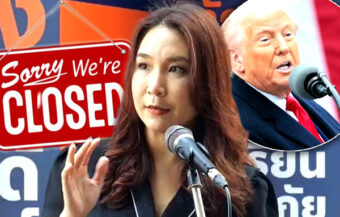Thailand faces mounting pressure as trade talks with the US stall, Sirikanya slams government confusion, Uyghur deportation strains ties, Chambers case draws MAGA attention in America and Trump’s tariffs may spark financial system contagion, says Bank of Thailand.
People’s Party MP and economic spokesperson Sirikanya Tansakul on Thursday expressed concern about the indefinite nature of Thailand’s arrangement to negotiate tariffs with the United States. It came as Prime Minister Paetongtarn Shinawatra, on her return from Cambodia, expressed a view that the White House appeared to be adjusting its position. Meanwhile, there are also fears that Thailand may have a problem with the United States over the February Uyghur deportations.

In addition, there have been calls from a family member of US academic Paul Chambers for the Trump administration to secure his release. Mr Chambers was charged with offences on April 10th and subsequently bailed.
However, he may not leave the country. In particular, Ms Sirikanya wanted to know why the Prime Minister and Minister of Finance Pichai Chunhavajira had contradicted each other on Tuesday.
It comes as Vietnam is pressing ahead with its US talks and rising concerns are being expressed by the Bank of Thailand. On Thursday, it warned that the tariff may impact over-extended large Thai firms.
Sirikanya criticises Thai approach to trade talks after postponement and Vietnam’s progress with the US
On Thursday, People’s Party spokeswoman for the economy, Sirikanya Tansakul, expressed her reservations about the Thai government’s handling of negotiations with the Trump White House.
This comes following a postponement of talks by Thailand announced on Tuesday. Previously, talks were to begin on Wednesday, the 23rd. Meanwhile, reports from Vietnam suggest that talks at the second stage have begun between the United States and Vietnam.
This involved a telephone conference between the US and Vietnamese sides yesterday. These were led by US Trade Representative Jamieson Greer and Vietnam’s Industry and Trade Minister Nguyen Hong Dien.
In the meantime, Prime Minister Paetongtarn Shinawatra on Thursday afternoon, upon her return from a trip to Cambodia, appeared to suggest a more cautious approach. In short, the PM hinted that a robust approach from the ASEAN community and other nations is necessary.
Prime Minister Paetongtarn initially declined to be interviewed at Don Mueang Airport but later provided some clarification at her office.
In essence, she suggests that many things have changed significantly in the last few weeks. The Prime Minister indicated that Thailand is not presently engaged in negotiation but rather observing how matters unfold.
Prime Minister calls for caution while Sirikanya questions conflicting messages from top ministers
“Thailand has chosen to closely monitor the situation and follow every angle and every side, both officially and unofficially, to see what is happening and what additional information is needed,” she said.
Certainly, this echoes what Deputy Prime Minister and Minister of Finance Pichai Chunhavajira said on Tuesday. However, previously on the same day at Government House, Prime Minister Paetongtarn said the talks on Wednesday were postponed by the United States.
On Thursday, Ms. Sirikanya, People’s Party MP, stated her concern that it appeared the Prime Minister and Finance Minister leading the negotiations had contradicted each other.
In turn, this led her to inquire why? Was it a misunderstanding? Certainly, she could understand the strategy outlined by Mr. Pichai. As to whether it would ultimately prove successful or not, she did not know.
Significantly, the postponement of the talks on Tuesday came just 24 hours after a warning from China. In brief, it stated that any country that sought to ‘please’ America at its expense would face retaliation.
Additionally, on Tuesday, Ms. Paetongtarn spoke of Thai entrepreneurs and farmers who were partners with Chinese firms.
PM says Trump tariffs are shifting as ASEAN seen as key to stronger trade negotiation strategy
“Now that some time has passed, there have been many changes. In less than 30 days, there have been quite a few changes, not just in Thailand but also around the world. It can be seen that the tax issue has been gradually adjusted.”
She also spoke of relying on neighbouring countries, particularly ASEAN members, to negotiate with the Trump White House.
“This will be something we can negotiate strongly. When we talked, I was glad that ASEAN countries agreed on this issue because when we negotiate, we have to negotiate like friends, negotiate without losing or gaining an advantage in an unacceptably large gap. But we have to negotiate for us and they are also strong. It has to be a win-win situation for both parties, which is something we agree on,” Prime Minister Paetongtarn said.
US-Vietnam negotiations progress as Cambodia acts while Thailand stays silent on Trump’s tariff plan
At the same time, negotiations with the United States and Vietnam are presently advancing. Sources close to Vietnamese officials suggest that they expect a final tariff rate of between 22% to 28% from the Trump opening rate of 46% ultimately to be deployed.
Certainly, that will also mean tightening up export fraud and the reshipment of Chinese products through the country. This is now known to have been widespread.
At the same time, Cambodia opened talks with the United States last Thursday. Just hours after Trump announced his tariff regime on April 2nd, Cambodian Prime Minister Hun Manet unilaterally reduced Cambodia’s tariff on US imports in 19 different areas.
So far, Thailand has not responded at all to the US tariff regime with any specific proposal or actions.
Certainly, on Thursday, Ms. Sirikanya expressed alarm at the lack of any definitive engagement between Thailand and the United States. She said that with contradictory statements from both Deputy Prime Minister Pichai and the Prime Minister, it now appears that Thailand is indefinitely postponing such talks.
“And when the appointment was made and they did not accept, it was necessary to postpone the schedule until the United States responded,” she noted. Therfore, she called on the government to communicate with the public and business sector just what was going on. ‘What is the real timetable?’ she asked.
Questions raised over Uyghur deportation and its impact on stalled US-Thai relations and trade progress
Furthermore, she raised growing doubts about the postponement of these talks. In addition to pressure from China, there are concerns that the United States may have raised the controversial repatriation of 40 Uyghur Muslims to China on February 27th.
This move came despite an assurance previously given to American officials that no such action would be taken.
In particular, it is understood to have piqued US Secretary of State Marco Rubio. Mr. Rubio had before he was confirmed indicated a desire to keep the Muslim refugees imprisoned in Thailand for nearly 10 years.
Following the repatriation, the US imposed sanctions on top Thai officials. These are believed to include cabinet members and security officials linked with the repatriation operation. However, names have never been confirmed.
On Thursday, Deputy Prime Minister Phumtham Wechayachai, who has responsibility for security and police, denied he was sanctioned. Specifically, he stated that he was never informed of any such measure. Mr. Phumtham is seen as a key ally of China in the Thai government.
Chambers case and Uyghur fallout fuel instability as Thailand awaits clarity on US tariff direction
When asked on Thursday if he was barred from travelling to the United States, he replied that there was no need to. The Ministry of Defense and related agencies under his control had already reported to the negotiating team.
After that came the controversial arrest on a lèse-majesté charge and Computer Crime Act offence of US academic Paul Chambers.
In recent days, Mr. Chamber’s brother Kit Chambers writing in The Oklahoman newspaper called for his brother to be allowed to travel home to Thailand. Indeed, the American implored White House and MAGA (Make America Great Again) stalwarts to make this a condition of talks with Thailand.
Of course, all of these developments add to chaos and confusion. At this time, it appears the Thai government is waiting on President Trump’s tariff initiative to be adjusted or to buckle.
Certainly, there is time to engage with the United States. However, the question of good faith must now be raised. Undoubtedly, this remains a powerful force in any successful negotiation.
In the meantime, Thailand is still being impacted by the baseline 10% tariff rate.
Thai financial stability at risk as Bank of Thailand warns about over-leveraged firms amid tariff crisis
On Thursday, once more, Ms. Sirikanya again called for the government to overhaul the 2026 budget. This is due to be voted on at the end of the month.
Furthermore, she confirmed that she had no problem with a ฿500 billion budget or plans laid by Minister of Finance Pichai Chunhavajira to address the downturn caused by the new Trump policy.
Paul Chamber’s brother says academic must be returned to the United States before US-Thai trade talks
China warns Thailand not to ‘please’ the United States at its expense. US trade talks again postponed
Thai economy thrown into disarray by Trump’s tariffs. Exports and Tourism may both be far lower in 2025
At the same time, the Bank of Thailand on Thursday warned about the tariff crisis. In particuallr saying it may create instability among highly leveraged or borrowed large Thai firms. Presently, 62% of funding for these firms or ฿3.2 trillion comes from the private sector bond market. In addition, ฿2.9 trillion exists in bank loans.
The central bank warned that a significant downturn in the economy could place some of these firms in difficulty. It suggests that such a development could threaten the kingdom’s financial stability.
Join the Thai News forum, follow Thai Examiner on Facebook here
Receive all our stories as they come out on Telegram here
Follow Thai Examiner here
Further reading:
Thaksin does not rule out joining talks in US as Thai team finalises plans. They fly out on Thursday
Trump’s remaking of World trade, if it works, will force Thailand to decide between the US and China
US offers a 90-day tariff pause but Thailand must move faster as it already faces shaved GDP in 2025
PM addresses the nation in shock over last week’s earthquake and this week’s Trump tariff bombshell


















